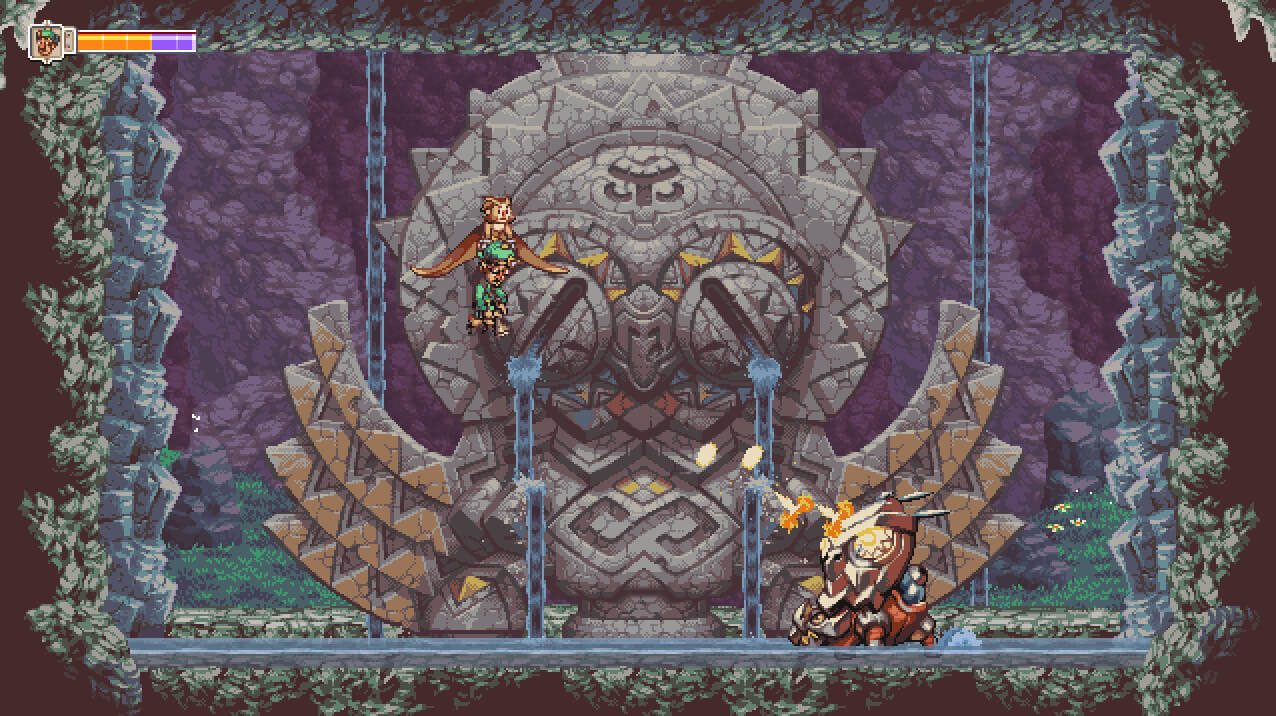By their very nature, retro-inspired games are fighting an uphill battle against the nostalgia they aim to invoke. How can they form their own identity when they’re partly designed to make you remember other games? After finishing Owlboy, it seems D-Pad Studio might have the answer.
For almost a decade, Owlboy has lurked behind the curtain of mainstream releases with a small-but-devout following. Looking at screenshots and videos over the years, it was always apparent that Owlboy would look and sound great, but there’s so much more to love about the final product: the humor, the varied cast, the disasters that befall its otherwise bright and uplifting world, and the incredible action set-pieces that punctuate the calm found elsewhere. It’s not until you break through the surface that you’re blinded by Owlboy’s artistic brilliance and swayed by its heartfelt story.











It begins with Otus–our mute protagonist and the runt of his village–during a stressful dream where his professor and dark figments criticize his inadequacies and chastise his inability to speak. It’s a powerful setup that endears our hero to you. Trouble brews shortly after he wakes up and concerns of pirate sightings explode into panic as a nearby metropolis comes under attack. Otus teams up with a military mechanic, Geddy, to put a stop to the pirates before their home is destroyed.
Owlboy is old-school, not just in its presentation, but also in its storytelling–there’s no voice acting, and events are set in stone with nary a major decision-making opportunity in sight. The plot manages to avoid predictability, however, not only through a handful of twists, but by allowing characters to evolve throughout the course of the game. Sad moments aren’t swept under the rug by unreasonable optimism–they stay with your squad and fundamentally alter their outlook on the mission and their own identity in surprising ways. There’s great attention to detail in the cast’s animations, which are often tailored for a specific scene, as opposed to falling back on routine reactions. Coupled with a script that’s rife with emotion and nuance, Owlboy’s characters feel real in your heart despite their cartoonish look.
Owlboy tackles multiple artistic themes and subjects with consistently impressive execution.
It may be a throwback of sorts, but Owlboy’s visuals aren’t tailored to specifically ape 8- or 16-bit graphics; it doesn’t have a limited color palette, and its pixel resolution changes based on the scene at hand. When you enter wide-open spaces, the camera zooms out, chunky details shrink, and meticulously designed structures and environments take shape. In tight spaces, you’re brought closer into the scene for more intimate inspection. From subterranean creatures to ancient structures, Owlboy tackles several artistic themes and subjects with consistently impressive execution. And if you have a soft spot for 2D games with multiple layers of parallax scrolling–where the background moves slower than the foreground to simulate depth–you’re in for a treat.
When you first take control of Otus, darting around floating islands and chatting with other creatures makes for a pleasant experience, and while the open air and bright colors deserve some credit, it’s the orchestrated soundtrack that solidifies Owlboy’s shifting atmosphere and tone. Violas and flutes instill merriment at first, but this innocence is short lived; when the pirates invade, oboes drone and cellos growl to the slow beat of a heavy drum. When the dust settles and the second half of your journey kicks off, sprightly piano compositions provide a much-needed respite from the stress of a society under attack.
Your trek to the pirate’s den takes you through expansive spaces and into the heart of sprawling cave systems where buccaneers and wildlife alike lie in wait. They typically bombard you with rocks and other projectiles, rarely engaging in close-quarters combat. On his own, Otus can only dash into enemies, stunning them at best. However, with the help of a handy teleportation device, he can summon one of three partners into his claws mid-flight to utilize their long-range blaster, shotgun, or webbing that can ensnare enemies and be used as a grappling hook to escape dangerous situations.
Otus is unfortunately a tad slow by default, which causes you to spam his dash move repeatedly to keep things moving along outside of combat. There’s a modest upgrade system driven by collecting and turning in coins found in chests, but you’re upgrading health reserves–in the form of soup canisters–and your team’s weapons, not physical traits. Still, a keen eye and fast reflexes are more critical to success than any upgrades purchased during your adventure. Knowing that success comes from a show of skill rather than your ability to collect upgrades is gratifying, but you walk away from Owlboy with the sinking feeling that the equipment and upgrades in the game have unrealized potential.
Owlboy is consistently charming and surprising, and when its final act doubles down on every front, it’s bittersweet to see it end.
Standard combat isn’t anything special, but it never wears out its welcome thanks to deft pacing. Owlboy steadily mixes combat and exploration with measured stealth challenges, fast-paced escape sequences, and entertaining exchanges between characters. The chase/escape sequences in particular are some of the most impressive moments in the game, throwing you into a harrowing race against time in the face of tightly choreographed hazards. These scenes are challenging and filled with visual effects that add to the sense of danger, and they’re overwhelming at first, but should you die, not to worry: Owlboy never truly punishes you for failure, allowing you to restart from the last room you entered.
Owlboy is consistently charming and surprising, and when its final act doubles down on every front, it’s bittersweet to see it end. As you relish the outcome of the final battle and watch the closing cutscene, you can’t help but reflect on the beginning of your adventure and how far the world and its inhabitants have come. You’ll never be able to play Owlboy for the first time again, but the memories of its magic moments stick with you. This is more than a treat for fans of old-school games; Owlboy is a heartfelt experience that will touch anyone with an affinity for great art and storytelling.
Editor’s note: After further testing, GameSpot has updated the score to reflect the Nintendo Switch version of Owlboy. – Feb. 13, 2018, 9:00 AM PT
Website: LINK


